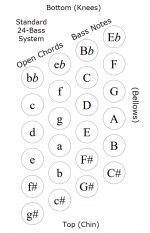I am kind of musing here. I did a search and didn't see a similar thread but if I missed it I apologize.
I never saw much of the benefit on a 12 bass of just having 6 major chords available. I understand that it's a limited instrument but it would make much more sense to me if it's crippled I would rather be limited to one key with majors and minors rather than have only majors for a few different keys. To that ends I think the key of F would make the most sense, it would require modifying the A, D, G chords to be minor. I am not sure how much work it would be to modify the mechanics of the bass system but a second option would be to just replace or retune the C#, F# and B reeds used in the chords. I could see the utility of a 12 bass then, as a kind of compact little knockabout. The more I think about it the more I'm kind of inclined to keep my eyes open for an old 12 bass to try it out.
Has anybody done this? I would be interested to hear if the mechanical method is viable and were the results ever really utilized.
I never saw much of the benefit on a 12 bass of just having 6 major chords available. I understand that it's a limited instrument but it would make much more sense to me if it's crippled I would rather be limited to one key with majors and minors rather than have only majors for a few different keys. To that ends I think the key of F would make the most sense, it would require modifying the A, D, G chords to be minor. I am not sure how much work it would be to modify the mechanics of the bass system but a second option would be to just replace or retune the C#, F# and B reeds used in the chords. I could see the utility of a 12 bass then, as a kind of compact little knockabout. The more I think about it the more I'm kind of inclined to keep my eyes open for an old 12 bass to try it out.
Has anybody done this? I would be interested to hear if the mechanical method is viable and were the results ever really utilized.




